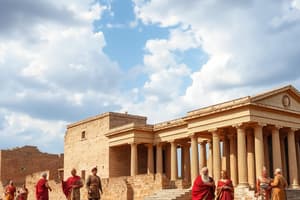Podcast
Questions and Answers
Who were Romulus and Remus?
Who were Romulus and Remus?
Sons of Rhea Silvia and Mars, grandsons of Numitor.
What year was Rome founded?
What year was Rome founded?
753 BCE
Which system was introduced after Rome became a republic in 509 BCE?
Which system was introduced after Rome became a republic in 509 BCE?
- Dictatorship
- Oligarchy
- Monarchy
- Checks and balances (correct)
The Punic Wars were fought against Greece.
The Punic Wars were fought against Greece.
Who was the first emperor of Rome?
Who was the first emperor of Rome?
What major period began with Augustus's rise to power?
What major period began with Augustus's rise to power?
Which emperor is known for expanding the Roman Empire to its greatest territorial extent?
Which emperor is known for expanding the Roman Empire to its greatest territorial extent?
What significant change did Constantine implement regarding Christianity?
What significant change did Constantine implement regarding Christianity?
What event led to the fall of the Western Roman Empire in 476 CE?
What event led to the fall of the Western Roman Empire in 476 CE?
The Sack of Rome occurred in 410 CE.
The Sack of Rome occurred in 410 CE.
Flashcards
Romulus and Remus
Romulus and Remus
Legendary twins said to have founded Rome.
Roman Republic
Roman Republic
Period of Roman history (509 BCE – 27 BCE) characterized by a system of shared power among Senate, Consuls and Assemblies.
Punic Wars
Punic Wars
Series of conflicts (264-146 BCE) between Rome and Carthage for dominance in the Mediterranean.
Pax Romana
Pax Romana
Signup and view all the flashcards
Augustus
Augustus
Signup and view all the flashcards
Edict of Milan
Edict of Milan
Signup and view all the flashcards
Constantine
Constantine
Signup and view all the flashcards
Crisis of the 3rd Century
Crisis of the 3rd Century
Signup and view all the flashcards
Barbarian Invasions
Barbarian Invasions
Signup and view all the flashcards
Fall of the Western Roman Empire
Fall of the Western Roman Empire
Signup and view all the flashcards
Study Notes
Early Rome (753 BCE - 509 BCE)
- Romulus and Remus, sons of Rhea Silvia and the god Mars, were grandsons of Numitor.
- Romulus killed Remus and founded Rome in 753 BCE.
- Rome was initially a monarchy, ruled by Etruscan kings.
- Kings introduced engineering advancements (e.g., sewage).
- Rome became a republic in 509 BCE after overthrowing the last Etruscan king, Tarquin the Proud.
Roman Republic (509 BCE - 27 BCE)
- A system of checks and balances, sharing power among the Senate, consuls, and popular assemblies.
- Consuls: Two elected annually, leading the government and army.
- Senate: Advisory council, influential in policy decisions.
- Tribunes: Representatives of the plebeians (common people).
- Social classes: Patricians (wealthy land-owning elite) and plebeians (commoners).
- Plebeians struggled for more rights.
Expansion of the Republic
- Unified the Italian peninsula.
- Fought the Punic Wars against Carthage (264-146 BCE), becoming a dominant power in the Mediterranean.
Rise of the Roman Empire
- The Roman Empire began in 27 BCE with Augustus, Julius Caesar's adopted heir.
- Augustus initiated the Pax Romana, a period of peace and stability lasting 200 years.
- He consolidated power after civil wars.
- Reformed the Roman army and strengthened institutions.
Major Emperors
- Augustus (27 BCE - 14 CE): First emperor, brought stability.
- Trajan (98-117 CE): Expanded the empire's territory to its greatest extent, including Dacia (modern-day Romania) and parts of the Middle East.
- Marcus Aurelius (161-180 CE): Renowned for his leadership in defending the empire from invasions and plagues.
- Constantine (306-337 CE): Made transformative changes including legalizing Christianity and shifting the empire's capital to Constantinople.
Fall of the Western Roman Empire
- The Crisis of the Third Century (235-284 CE): Economic decline, internal political turmoil, and constant military threats.
- Barbarian Invasions: Germanic tribes (Visigoths and Vandals) invaded Roman territories.
- Visigoths sacked Rome in 410 CE, and the Vandals in 455 CE. These events weakened Roman authority, leading to the Western Roman Empire's fall in 476 CE.
Studying That Suits You
Use AI to generate personalized quizzes and flashcards to suit your learning preferences.





